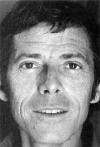Quotes by James Merrill
Before trying a novel I wrote a couple of plays.
He puts his right hand lightly on the cup, I put my left, leaving the right free to transcribe, and away we go. We get, oh, 500 to 600 words an hour. Better than gasoline.
Knowing some Greek helped defuse forbidding words - not that I counted much on using them. You'll find only trace elements of this language in the poem.
Because of its length and looniness I'd taken to calling it the Divine Comedy - not of course a usable title, until David Jackson thought of making it plural. Dante, subtler as always, let posterity affix the adjective.
I'd like to think the scientists need us - but do they? Did Newton need Blake?
And, as I have said, it's made me think twice about the imagination. If the spirits aren't external, how astonishing the mediums become! Victor Hugo said of his voices that they were like his own mental powers multiplied by five.
Chiefly, I think, the - to me - unprecedented way in which the material came. Not through flashes of insight, wordplay, trains of thought. More like what a friend, or stranger, might say over a telephone.
Arthur Young's Reflexive Universe - fascinating but too schematic to fit into my scheme. The most I could hope for was a sense of the vocabulary and some possible images.
Strange about parents. We have such easy access to them and such daunting problems of communication.
Oh, I picked up a two-volume Guide to Science by Asimov - very useful, still, each time I forget how the carbon atom is put together, or need to shake my head over elemental tables.
But those two plays left me on fresh terms with language. I didn't always have to speak in my own voice.
In life, there are no perfect affections.
The simplest science book is over my head.
At college I'd seen my dead frog's limbs twitch under some applied stimulus or other - seen, but hadn't believed. Didn't dream of thinking beyond or around what I saw.
Don't ask me to paraphrase his thesis - but, reading Jaynes as I was finishing Mirabell, I rather goggled. Because the poem is set by and large in two adjacent rooms: a domed red one where we took down the messages, and a blue one, dominated by an outsize mirror, where we reflected upon them.
What had the man done? Oh, made history. Her business (he had implied) was giving birth, Tending the house, mending the socks.
In a room on the floor below, Sunless, cooler—a brimming Saucer of wax, marbly and dim— I have lit what's left of my life.






